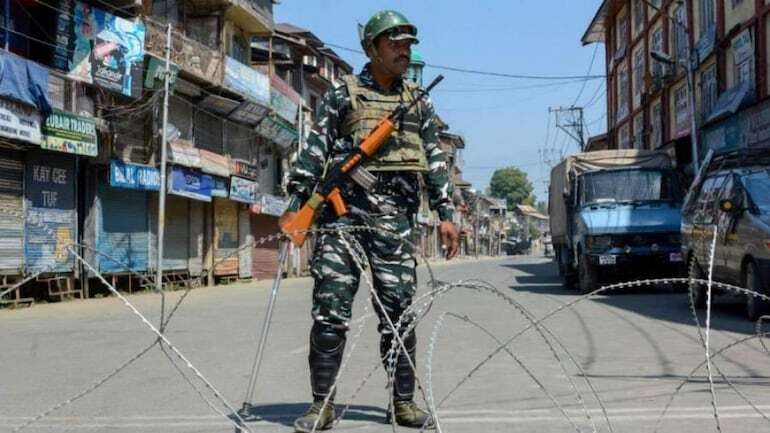A tightrope walk for Delimitation Commission in Jammu & Kashmir

Political parties in Kashmir Valley remain apprehensive about the fairness of delimitation (Photo: PTI)
The Delimitation Commission which was tasked with the reorganisation of constituencies from March 2020 to March 2021 says it has made a thorough note of the dissent and opposition by the public and political parties, in the union territory of Jammu and Kashmir. While many Kashmir-based political parties along with various civil society groups had welcomed the commission, there were some who have stayed away from the exercise.
Most notable amongst those boycotting the panel, which will set new boundaries for assembly and Parliamentary constituencies is the Peoples Democratic Party (PDP), led by former chief minister Mehbooba Mufti saying that the panel had come with pre-planned outcomes of its work in the region and that the entire exercise reflected a one-sided agenda of the union government. In her determination to stay aloof, Mufti also alleged that the commission’s aim was to disempower the people of J&K, and bring a shift in power, favouring a particular political party.
Though the National Conference, another opposition party in the state, participated in a meeting with the panel, it maintained that the delimitation exercise should not have been conducted till the Supreme Court had decided on multiple pleas challenging the constitutional validity of the Jammu and Kashmir Reorganisation Act 2019. It added that under the constitution, the delimitation of assembly constituencies fell within the powers of the state of J&K and it was to be undertaken only once the figures of the first census after 2026 are published.
“Despite our basic reservations on the issue, the commission has decided to go ahead with the delimitation process. While reiterating our stand and without prejudice to the submissions made above, we request you and other members of the Commission to carry out the delimitation exercise in a free, fair and transparent manner so that the unity and integrity of the state is safeguarded. Population has to be the only norm as has been the practice here in the past in J&K and elsewhere in the country,’’ the National Conference said in a statement. Nonetheless, commencing its activities, the panel held a four-day meet with various national and regional parties along with administrators and civil society groups.
The commission then travelled to different places across J&K ‘with the aim of incorporating the many voices of the people’ in the reorganisation process.
At the end of the exercise, Sushil Chandra, Chief Election Commissioner, tried to assuage the fears of opponents of the delimitation process. – “We have taken all the demands and recommendations into account, a draft will be prepared and put in the public domain for their comments,” He said, adding that 24 seats in Pakistan Occupied Kashmir would be excluded from the delimitation process.
The delimitation commission is a powerful independent body whose decisions and implementations cannot be challenged in any court of law. Its primary responsibilities involve the redrawing of boundaries of various constituencies based on recent census, which in the case of Jammu and Kashmir was in 2011.
The last delimitation in J&K had taken place 1995. Subsequently, in 2002 an amendment was made in the J&K Peoples Representation Act and delimitation in Jammu and Kashmir was disallowed till 2026.
Delimitation in Jammu & Kashmir is complicated due to both external and internal factors. While most opposition political parties want the region to regain its special status and say the ruling Bharatiya Janata Party had a hidden agenda behind the entire redrawing exercise. They also question how fair the delimitation commission had been in its including people’s demands and concerns.
“The entire process is biased and involves a clear-cut agenda of the centre. The centre’s main aim is to bring a non-Muslim to power as the chief minister of an area that is largely Muslim. The delimitation was to take place by 2026, so why was the centre driven by such urgency to delimit within twelve months? Its clear that the centre aims to restore statehood to the union territory through early elections,” says Tariq Adeeb, who is a lawyer by profession.
“When it comes to demarcation of constituencies, the commission is found to be not entirely fair and transparent in its functioning. It can’t be, I believe, because in whichever region a particular religious community or caste happens to be in majority, the seats tend to be won by those who belong to the same community. So, it is quite natural that the carving of the constituencies take place keeping in mind the interests and representatives of the majority community in that particular area,” says Ankit Alok Kashyap, who is a professor of Political science in Noida, near Delhi.
But others dispel such fears. Venkata Krishna is a Supreme Court lawyer and founder of Friends of Jammu Foundation, that fights for rights of the people of Jammu. The foundation has also adopted a small village called Basoli in Jammu where it is helping a group of artisans find markets for their handwoven shawls. Krishna defends the delimitation to be fair and just. He states that “The delimitation of Jammu and Kashmir was purely scientific, based on demography and population density of the region. It was in contrast to that of 1951 which had no scientific basis in terms of demography, geography, population or census. Thus, the Commission that functioned as per the 2011 Census was fair in its demarcation.”
Whatever may be the circumstances or situation that the Delimitation Commission was being confronted with, whether it be on the lines of caste and tribe or an inclination towards religion, the commission must hold fast to its promise of free and fair representation while reorganising constituencies across the country.









